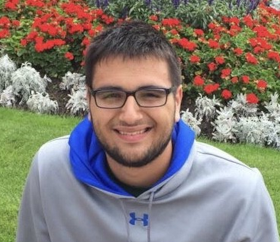Jacob Shomali '22

I am a fourth-year student with a double major in neuroscience and philosophy and minors in biochemistry and Spanish.
I am on the pre-med track with plans to become a psychiatrist. I am especially interested in substance use disorders and culturally-competent mental health services.
After graduation, I plan to do a year of service with the government-led AmeriCorps program before attending medical school. On campus, I am involved in neuroscience research, chemistry tutoring, tour guiding, the Scranton Neuroscience Society (president), performance music, the Health Professions Organization, and volunteering at the Leahy Clinic.
Inside The Classroom
I absolutely love majoring in neuroscience and philosophy. The University’s neuroscience program allows me to explore the study of behavior from a biological perspective. We have a great neuroscience community of students and faculty that provides me with academic and emotional support.
I also declared a philosophy major after several semesters in the Special Jesuit Liberal Arts Program (SJLA), to further develop my critical thinking skills and engage with history’s great philosophers. Together, my neuroscience and philosophy courses have allowed me to explore both the “why” and “how” of human behavior.
In general, my favorite part of the University of Scranton is our tight-knit sense of community formed through Jesuit values.
Research Experience
I have obtained extensive research experience in my college career. During my first year of college, I joined Dr. Seid's eusocial insect lab, where we study behavioral neurobiology and brain morphology in ants and bees. Under his guidance, I applied for and obtained a competitive multidisciplinary neuroscience research fellowship in my sophomore year.
The summer after my sophomore year, I studied the proteomics of a novel animal model of Parkinson's at the University of Nebraska Medical Center's summer undergraduate research program.
In the summer of 2021, I studied the neurological and behavior effects of oxytocin treatment for opioid addiction animal models at the Medical University of South Carolina. My research experience has developed my critical thinking and helped shaped my future career as a physician.





